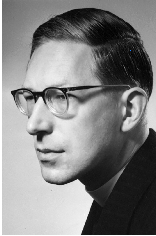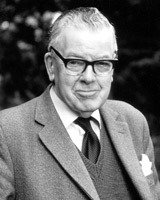The Engel scale was developed by James F. Engel, as a way of representing the journey from no knowledge of God, through to spiritual maturity as a Christian believer. [1] The model is used by some Christians to emphasise the process of conversion and the various decision-making steps that a person goes through in becoming a Christian. [2]
The original model was developed by James F. Engel and Viggo Søgaard. It was later refined by Engel, who added several ideas from behavioural science, and published it in his 1975 book with W.F. Norton What's Gone Wrong With the Harvest and 1979 publication Contemporary Christian Communications. [1]
The model emphasises the journey of faith and spiritual maturity through a number of stages. [3]
+5 Stewardship +4 Communion with God +3 Conceptual and behavioral growth +2 Incorporation into Body +1 Post-decision evaluation New birth -1 Repentance and faith in Christ -2 Decision to act -3 Personal problem recognition -4 Positive attitude towards Gospel -5 Grasp implications of Gospel -6 Awareness of fundamentals of Gospel -7 Initial awareness of Gospel -8 Awareness of supreme being, no knowledge of Gospel
Two possible additional stages before stage eight could be: -9 Unawareness of supreme being. -10 Resistance or antagonism to the concept of a supreme being.
The Engel scale has been criticized for its fixed linear approach, which has led to a number of modifications. [4] Søgaard developed the Engel Scale into a two dimensional model in 1986. [1] The Gray Matrix, another two dimensional model produced by Frank Gray of Feba Radio, and Thom S. Rainer's Faith Scale are both also derived from it. [5]
The Christian countercult movement or the Christian anti-cult movement is a social movement among certain Protestant evangelical and fundamentalist and other Christian ministries and individual activists who oppose religious sects that they consider cults.

In Christianity, evangelism or witnessing is the act of preaching the gospel with the intention of sharing the message and teachings of Jesus Christ. It is sometimes associated with Christian missions.

Carl Ferdinand Howard Henry was an American evangelical Christian theologian who provided intellectual and institutional leadership to the neo-evangelical movement in the mid-to-late 20th century. He was ordained in 1942 after graduating from Northern Baptist Theological Seminary and went on to teach and lecture at various schools and publish and edit many works surrounding the neo-evangelical movement. His early book, The Uneasy Conscience of Modern Fundamentalism (1947), was influential in calling evangelicals to differentiate themselves from separatist fundamentalism and claim a role in influencing the wider American culture. He was involved in the creation of numerous major evangelical organizations that contributed to his influence in Neo-evangelicalism and lasting legacy, including the National Association of Evangelicals, Fuller Theological Seminary, Evangelical Theological Society, Christianity Today magazine, and the Institute for Advanced Christian Studies. The Carl F. H. Henry Institute for Evangelical Engagement at Southern Baptist Theological Seminary and the Carl F. H. Henry Center for Theological Understanding at Trinity International University seek to carry on his legacy. His ideas about Neo-evangelism are still debated to this day and his legacy continues to inspire change in American social and political culture.
A Christian mission is an organized effort to carry on evangelism or other activities, such as educational or hospital work, in the name of the Christian faith. Missions involve sending individuals and groups across boundaries, most commonly geographical boundaries. Sometimes individuals are sent and are called missionaries, and historically may have been based in mission stations. When groups are sent, they are often called mission teams and they do mission trips. There are a few different kinds of mission trips: short-term, long-term, relational and those that simply help people in need. Some people choose to dedicate their whole lives to mission. Missionaries preach the Christian faith, and provide humanitarian aid. Christian doctrines permit the provision of aid without requiring religious conversion. However, Christian missionaries are implicated in the genocide of indigenous peoples. Around 100,000 native people in California, U.S., or 1/3 of the native population, are said to have died due to missions.
Edward Michael Bankes Green was a British theologian, Anglican priest, Christian apologist and author of more than 50 books.

James Innell Packer was an English-born Canadian evangelical theologian, cleric and writer in the low-church Anglican and Calvinist traditions. He was considered one of the most influential evangelicals in North America, known for his best-selling book Knowing God, written in 1973, as well as his work as an editor for the English Standard Version of the Bible. He was one of the high-profile signers on the 1978 Chicago Statement on Biblical Inerrancy, a member on the advisory board of the Council on Biblical Manhood and Womanhood, and also was involved in the ecumenical book Evangelicals and Catholics Together in 1994. His last teaching position was as the board of governors' Professor of Theology at Regent College in Vancouver, British Columbia, in which he served from 1996 until his retirement in 2016 due to failing eyesight.

Albert Benjamin Simpson, also known as A. B. Simpson, was a Canadian preacher, theologian, author, and founder of the Christian and Missionary Alliance (C&MA), an evangelical denomination with an emphasis on global evangelism that has been characterized as being Keswickian in theology.

Frederick Fyvie Bruce, usually cited as F. F.Bruce, was Rylands Professor of Biblical Criticism and Exegesis at the University of Manchester from 1959 until 1978 and one of the most influential evangelical scholars of the second half of the twentieth century. His importance comes from the fact that in a time when the academic community looked down upon Evangelicals, Bruce demonstrated that worthwhile academic work could be done by a scholar holding evangelical views. At the same time, Bruce persuaded Evangelicals that they should not turn their backs on academic methods of Bible study, even if the results might differ from traditional evangelical views. As a result, he has been called the “Dean of Evangelical Scholarship.”
Christians have used many different approaches to spread Christianity via the practice of evangelism. Christianity began with only a few different evangelistic approaches, but over the years, many different forms of evangelism have been employed by various groups to spread their faith. Many of these forms of evangelism are often employed in only certain parts of the world by Christians in different geographical areas. In particular, most new approaches to evangelism today have arisen out of Europe or the United States, especially when new technologies are used for the effort of evangelism.
The Fundamentals: A Testimony To The Truth is a set of ninety essays published between 1910 and 1915 by the Testimony Publishing Company of Chicago. It was initially published quarterly in twelve volumes, then republished in 1917 by the Bible Institute of Los Angeles as a four-volume set. Baker Books reprinted all four volumes under two covers in 2003.
Elmer Leon Towns is an American Christian academic, pastor and writer who co-founded Liberty University, the largest private non-profit university in the world, alongside Jerry Falwell in 1971. Towns is also a prominent Christian leader and speaker on the principles of church growth, church leadership, Christian education, Sunday school, and prayer and fasting. He has written over 170 books, eight of which are listed on the Christian Booksellers Association Best Selling List. In 1995, his book The Names of the Holy Spirit received the Gold Medallion Award from the Evangelical Christian Booksellers Association for Book of the Year in Biblical Study. Most recently Towns has served as Dean of the B. R. Lakin School of Religion, Dean of Liberty University Baptist Theological Seminary, and Distinguished Professor of Systematic Theology at Liberty University. In fall 2013, Towns announced he would be taking a sabbatical from his teaching and administrative duties to focus on speaking and writing.
John William Drane is a Christian theologian and author. He is probably best known for his two books on the Bible, Introducing the Old Testament and Introducing the New Testament.
Integral mission or holistic mission describes an understanding of Christian mission that embraces both evangelism and social responsibility. With origins in Latin American, integral mission has influenced a significant number of Protestants around the world through the Lausanne Movement.
David Oscar Moberg was an American Christian scholar, who was Emeritus Professor of Sociology at Marquette University. His areas of specialization included methodology in qualitative research, sociology of religion, sociology of American evangelicals, ageing and religion (gerontology).

Frank Arthur "Bones" Jenner was an Australian evangelist. His signature approach to evangelism was to ask people on George Street, Sydney, "If you died within 24 hours, where would you be in eternity? Heaven or hell?" Born and raised in England, he contracted African trypanosomiasis at the age of twelve and suffered from narcolepsy for the rest of his life. After some time, he joined the Royal Navy, but deserted in New York and joined the United States Navy. When he was 24, he deserted again while in Australia. He subsequently worked for the Royal Australian Navy until he bought his way out in 1937.
Myron Augsburger is an American Mennonite pastor, professor, theologian, and author. He is the former president of both Eastern Mennonite College and the Council for Christian Colleges and Universities.
Harold A. Netland, is a missionary educator turned academic. He is the author or editor of nine books and many journal articles on the topic of religion and philosophy.
The salvation bracelet, also known as the gospel bracelet, witness bracelet, or wordless bracelet, is a bracelet used as a tool of Christian evangelism. The bracelet consists of a series of colored beads which represent key aspects of the Christian gospel.
Protestant theology refers to the doctrines held by various Protestant traditions, which share some things in common but differ in others. In general, Protestant theology, as a subset of Christian theology, holds to faith in the Christian Bible, the Holy Trinity, salvation, sanctification, charity, evangelism, and the four last things.